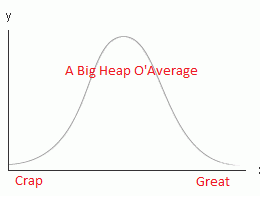
I’ve never been a big science fiction reader, so the name Theodore Sturgeon meant nothing to me. But he’s been inducted into the Science Fiction and Fantasy Hall of Fame, so I guess as an author he might be a big deal. Regardless of whether you’re familiar with his books, you’ve probably heard or read his words.
Often paraphrased as “90% of everything is crap,” Sturgeon’s Revelation (sometimes called Sturgeon’s Law) is one you’ll see bandied about in various contexts. In my experience the most common situation will be coming from the mouth of an elitist of some kind, one of those people who look down on everyone and everything. Needless to say, I’ve read or heard this many times in reference to indie publishing from both sides of the discussion.
I’m tempted to apply a little pop psychology on those who like to make this pronouncement. Instead I’m going to propose a new saying. We’ll call it BigAl’s Rebuttal. Fifty or a hundred years from now it can be what I’m remembered for and it goes like this:
90% of people who say that 90% of everything is crap are full of crap.
I don’t anticipate that I’ll be remembered for couth, subtlety, or sentences without word repletion issues. While I’m in the process of cementing my legacy, how about BigAl’s Corollary?
Roughly 60% of everything is close to average.
BigAl’s Corollary (now I understand why authors struggle writing bios in third person) gets to the heart of my reasoning for BigAl’s Rebuttal. Mediocre, crap, second-rate, and whatever words Roget claims mean about the same thing are relative to the universe being considered, just as great, fantastic, and tremendous are. And these words aren’t going to apply to the majority of items being considered in that universe. Most will fall somewhere in the middle. You could even graph it on a bell curve which is called normal distribution for a reason.

The thing that most amuses me about Sturgeon’s Revelation as commonly paraphrased is that it completely misses the point he was trying to make. The full quote first published in the March 1958 issue of Venture magazine goes like this:
I repeat Sturgeon’s Revelation, which was wrung out of me after twenty years of wearying defense of science fiction against attacks of people who used the worst examples of the field for ammunition, and whose conclusion was that ninety percent of SF is crud. Using the same standards that categorize 90% of science fiction as trash, crud, or crap, it can be argued that 90% of film, literature, consumer goods, etc. are crap. In other words, the claim (or fact) that 90% of science fiction is crap is ultimately uninformative, because science fiction conforms to the same trends of quality as all other art forms.
It turns out that regardless of what people claim Sturgeon said, what he actually said was right. Many of you know exactly how he felt when he said it. I hope no one misquotes me this badly. That’s not the legacy I want.

Good one, Al. I could make a crude joke but I’ll forebear. 😉
Don’t hold back, Yvonne. Now you’ve got me curious. 🙂
I love it! 😀 Thanks, Big Al!
I’m -90% convinced of the need for percentages when talking about art. Great post, Al.
Thanks Lynne and DV.
It’s not in most people’s nature to be totally honest, Al. In my experience, and you are quite right, most people describe things (pretty much anything) as ‘great’ or ‘crap’. Hardly ever would you hear someone say, about anything but let’s just call it a book or a film, “It was a hugely average piece of work!”
Excellent point, TD.
I’m a Sturgeon fan, but had never heard that saying, misquoted or otherwise, so thank you. It’s actually a relief to know I have a 90% chance of being average – at least I’m less likely to be crap. 🙂
And exactly average is better than half the others, Andrea.That may not be (I’d say shouldn’t be) anyone’s ultimate goal, but it is an accomplishment. 😀
Thanks for the comment.
“Roughly 60% of everything is close to average.”
I like this. I will strive to be in the other 40%. Bad or great it is. Fun post.
Thanks,Lois. I think you’ve got the right idea. The truly great are going to inspire a passionate response, even if it is hating it. If readers say you’re in the top or bottom 20%, it might be a sign that you’re doing it right. 🙂